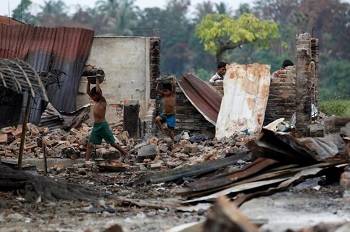UN special rapporteur on human rights in Myanmar calls for international probe into abuses against Rohingya Muslims.
Myanmar "may be trying to expel" all ethnic Rohingya from its territory, a UN rights expert says, pushing for a high-level inquiry into abuses against the Muslim minority community.
Yanghee Lee, the UN special rapporteur on human rights in Myanmar, told the UN rights council in Geneva on Monday evidence indicated a full purge could be the ultimate goal of the institutional persecution being perpetrated against the Rohingya.
Bangladesh experiences biggest Rohingya refugee influx in two decades
"Conducting a household survey - where those absent may be struck off the list that could be the only legal proof of their status in Myanmar - indicates the government may be trying to expel the Rohingya population from the country altogether," she said.
The army launched a bloody crackdown against the Rohingya in October in the northern Rakhine state following attacks by rebels on several border posts.
UN investigators say during the military operation women were gang-raped by soldiers and Rohingya babies were slaughtered.
Lee wants the rights council to establish the UN's highest-level probe, a Commission of Inquiry, to investigate the crackdown, as well as violent episodes in 2012 and 2014.
Myanmar's UN envoy in Geneva Htin Lynn said at the council on Monday the allegations were unverified and one-sided. He said security operations in Rakhine had stopped and the curfew was eased earlier this month.
"The situation in Rakhine state is very complicated in nature and thus requires complicated answers. It also requires greater understanding by the international community," he said.
"Myanmar does not accept the idea of a commission of Inquiry, as we are seriously addressing the allegations nationally."
The council could set up the commission before its session ends later this month, but key players including the European Union have not yet backed Lee's call because of concern that a damning UN investigation might threaten the country's fragile democracy drive.
Speaking to reporters after her council appearance, Lee said she believed support for an inquiry was tepid, including within the EU.
Countries "won't say they are not going to support your call, but I do hear ... [countries] say that maybe Aung San Suu Kyi needs more time", Lee said, referring to the Nobel peace laureate who leads Myanmar's civilian government.
Suu Kyi's administration, which took charge last year after decades of oppressive military rule, has rejected Lee's bid to set up the investigation and insisted its own national probe can uncover the facts in Rakhine.
Lee conceded a full international probe "could have a destabilising affect" - in that it may implicate the military in crimes against humanity - but she insisted it was in the government's interest to get the facts out.
She also told the council the government's internal probe had already been proved inadequate.
Representatives from the EU, the Netherlands, and Britain all avoided the question of the investigation during Monday's discussion.
Julian Braithwaite, Britain's envoy to the council, said the international community needed to "engage [Myanmar] without damaging the delicate civilian-military balance".
PHOTO CAPTION
Children recycle goods from the ruins of a market which was set on fire at a Rohingya village outside Maugndaw in Rakhine state, Myanmar, October 27, 2016. REUTERS
Al-Jazeera


 Home
Home Discover Islam
Discover Islam Quran Recitations
Quran Recitations Lectures
Lectures
 Fatwa
Fatwa Articles
Articles Fiqh
Fiqh E-Books
E-Books Boys & Girls
Boys & Girls  Ramadan
Ramadan Fatwa Audios
Fatwa Audios Month of Mercy
Month of Mercy Women
Women Eed Al- Fitr
Eed Al- Fitr Food Recipes
Food Recipes Videos
Videos

 Prayer Times
Prayer Times












